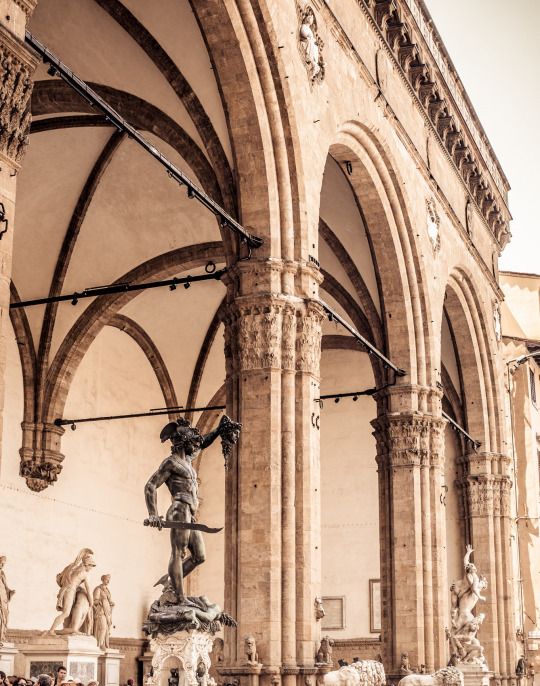***Statcounter is installed on this blog!*** Just a general sideblog where I, @undine66770, can dump all my works/worlds/etc. Enjoy! Cover photo made with Azgaar's Fantasy Map Generator. If you have any questions about Eludin or its inhabitants or something else, feel free to ask!
Don't wanna be here? Send us removal request.
Text
words to use instead of ________
"Mad"
aggravated, angry, annoyed, boiling, cross, enraged, exasperated, fuming, furious, heated, incensed, indignant, irate, irritable, livid, offended, outraged, riled, steamed, storming, upset
"Nice"
amiable, charming, cordial, courteous, delightful, favorable, friendly, genial, gentle, gracious, helpful, inviting, kind, lovely, obliging, peaceful, peachy, pleasant, polite, swell, sympathetic, tender, welcoming, well-mannered, winning
"Pretty"
alluring, appealing, attractive, beautiful, charming, cute, delightful, desirable, elegant, eye-catching, fair, fascinating, gorgeous, graceful, intriguing, lovely, pleasing, striking, stunning, sweet
"Said"
alleged, argued, asked, asserted, babbled, bellowed, bragged, commented, complained, cried, declined, demanded, denied, encouraged, expressed, giggled, growled, inquired, moaned, nagged, rebuked, rebutted, replied, rejected, retorted, roared, scolded, shrieked, shrugged, stated, taunted, vowed, warned, whined, whispered, yelled
"Went"
avoid, bolt, bound, depart, exit, escape, flee, fly, hike, hop, jaunt, jolt, journey, leap, leave, lurch, march, mosey, move, pace, parade, pass, progress, retreat, saunter, scoot, skip, split, step, stride, stroll, tour, travel, vanish
more words to use instead other words to use instead another list of words to use instead
Writing Resources PDFs
12K notes
·
View notes
Text
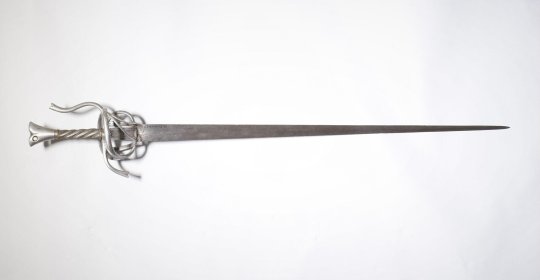

Sword, Austria, circa 1600
from The Victoria and Albert Museum
470 notes
·
View notes
Text
words to use instead of ______
"Very"
Mild: clearly, decidedly, distinctly, markedly, considerably, notably, largely, recognizably, especially, indubitably Moderate: especially, surprisingly, substantially, uncommonly, chiefly, incredibly, obviously, unmistakably, considerably, awfully, wonderfully, particularly Bold: profusely, unequivocally, strikingly, astonishingly, exceedingly, absolutely, exceptionally, extremely, unquestionably, vastly, incontestably
"A Lot" (time)
Mild: often, oftentimes, sometime Moderate: frequently, usually, various, generally Bold: regularly, recurrent, persistent
"A Lot" (size)
Mild: many, much, several Moderate: numerous, bountiful, considerable Bold: multitude, profuse, vast
"Big"
Mild: sizable, ample, large, considerable, great, above average, important Moderate: ponderous, significant, crucial, vast, copious, magnificent, substantial Bold: enormous, immense, colossal, extensive, endless, paramount, boundless, prodigious, imposing, gigantic, voluminous, limitless, essential
"Small"
Mild: slight, limited, trivial, minor, light, puny, superficial, undersized, dinky, negligible, faint Moderate: scant, petite, inconsiderable, microscopic, dwarf, unsubstantial, minimum, miniature, tiny Bold: insignificant, minute, meager, infinitesimal, ineffectual, undetectable, inconsequential
"Good"
Mild: acceptable, favorable, agreeable, pleasing, satisfactory, satisfying, super, able, relevant, accomplished, efficient, reliable, ample, useful, profitable, adequate, adept Moderate: great, honorable, admirable, commendable, sound, splendid, superb, valuable, wonderful, worthy, clever, proficient, qualified, apt, skillful, thorough, wholesome Bold: excellent, exceptional, gratifying, marvelous, reputable, stupendous, superior, exemplary, virtuous, expert, solid, advantageous, flawless, extensive, perfect
"Bad"
Mild: cheap, dissatisfactory, faculty, off, mean, wrong, unpleasant, unwell, low, grim, sour, regretful Moderate: careless, defective, inferior, imperfect, deficient, rough, ill-suited, inadequate, unsatisfactory, delinquent, sinful, unruly, wicked, rancid, grave, harsh, terrible, downcast Bold: awful, unacceptable, corrupt, dreadful, putrid, erroneous, detrimental, ruinous, vile, villainous, diseased, adverse, evil
more words to use instead other words to use instead even more words to use instead
Writing Resources PDFs
13K notes
·
View notes
Text
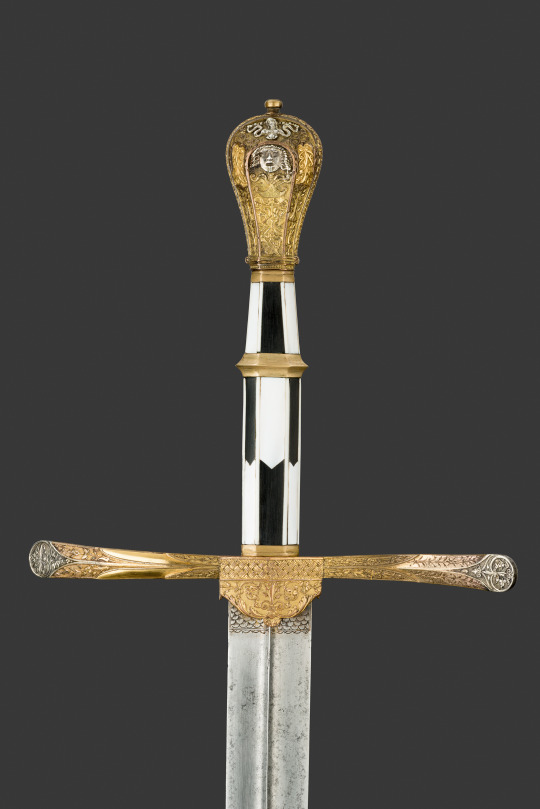
Hand and a half sword decorated with brass, silver, and ivory, Italy, circa 1490-1500
from Peter Finer
583 notes
·
View notes
Text

Rapier, Italian, circa 1610-1620
from The Art Institute of Chicago
252 notes
·
View notes
Text
Archaic Words: Injuries & Death

writing inspiration for your fight scenes
Apeyrement - injury
Ascat - broken like an egg
Bresure - a bruise or sore
Byhanggid - hanged up
Byhefded - beheaded
Chined - broken in the back (e.g., chined his back, i.e., broke his back)
Diffade - to injure
Emperish - to injure, or impair
Flean - flayed
Frush - to bruise; to indent; to break, or dash to pieces
Hop headless - when a king beheaded a person, he was said to make him hop headless, a phrase which occurs in many early writers, and was even applied to decapitation in battle
Mench - to bruise, to beat up
Mudgelly - squashed; trampled on
Outraie - to injure; to ruin; to destroy
Scrim - to crush; to bruise
Sherdel - skinned
Sleep away - an idiomatic phrase signifying a gradual decay
Slocken - to suffocate in mud, and perhaps at times to drown simple. If a person should have been suffocated by getting into a bog or marsh he would be said to have been slockened; and the term was applied to a drunken man, who had perished in a ditch or running stream.
Stongen - to stab; to pierce
Worowe - to choke
Source ⚜ More: Notes & References ⚜ Word Lists ⚜ Writing Resources PDFs
283 notes
·
View notes
Text
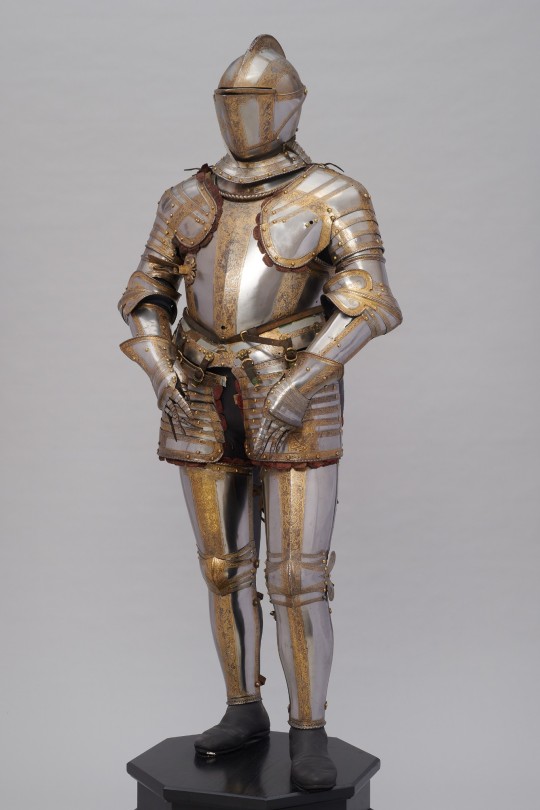
An elegantly etched and gilt armor for Paolo Giordano Orsini, Italy, ca. 1555, housed at the Kunsthistorisches Museum, Vienna.
383 notes
·
View notes
Text
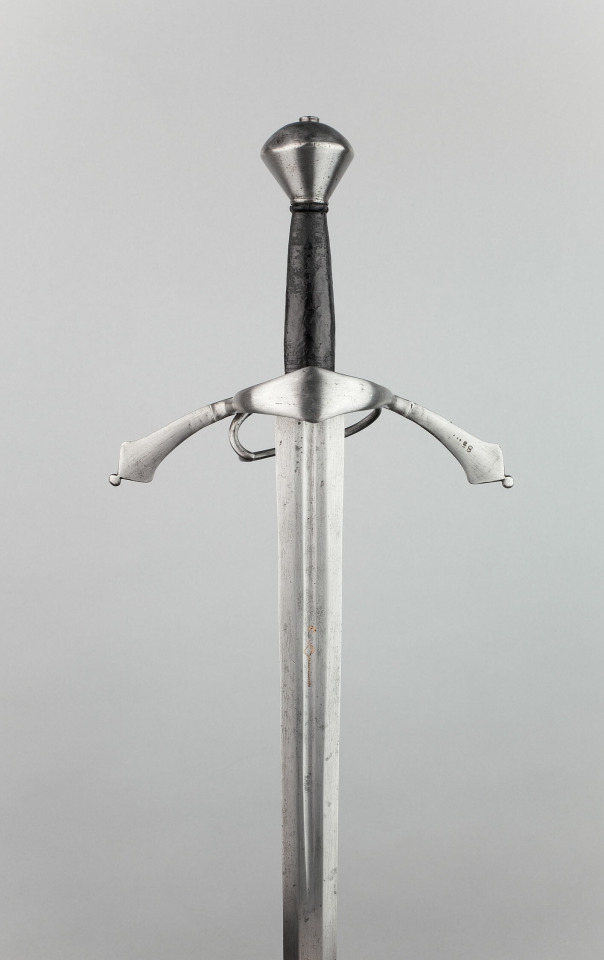
Sword from the Armory of Schlos Ambras, Inssbruck, Germany, circa 1570-1590
from The Art Institute of Chicago
176 notes
·
View notes
Text
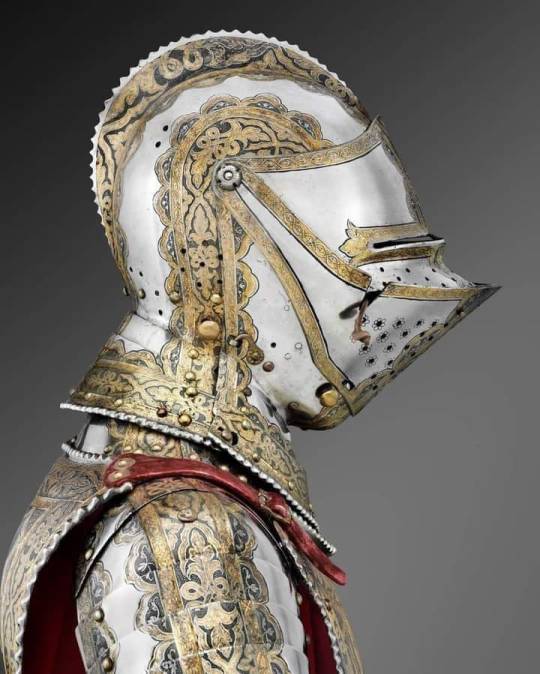
This armor garniture, crafted between 1550-1555 AD by an unknown German maker and attributed to Holy Roman Emperor Maximilian II (who reigned from 1564 to 1576), is a comprehensive suit of armor with interchangeable parts.
It forms part of an extensive set comprising more than five hundred pieces. Additional components of this garniture are housed at the Historisches Museum der Stadt in Vienna, Austria.
121 notes
·
View notes
Note
Please help! I’m writing musicians but am gravely afraid of being so inaccurate I’ll get laughed at. Do you have any general tips for writing musicians/celebrities/rich people or all three?
Writing Notes: Musicians
Musician - creates, performs, or composes music.
Diverse in their talents, encompassing a wide range of instrumental, vocal, and compositional abilities.
They may specialize in various genres such as classical, jazz, rock, pop, electronic, or folk music, and their proficiency may extend to multiple instruments or vocal techniques.
Duties & Responsibilities
The duties and responsibilities of musicians can vary depending on their specific roles, genres, and settings. However, here are some general duties and responsibilities that musicians often have:
Practice and Rehearsal: Musicians need to dedicate significant time to practicing their instruments or vocals to maintain and improve their skills. They also participate in rehearsals with other musicians or bands to synchronize their performances.
Performances: Musicians are responsible for delivering live performances, whether in concerts, gigs, recitals, or other venues. They must prepare their repertoire, select appropriate songs or compositions, and perform them with skill and expression.
Collaboration: Many musicians work collaboratively with other musicians, bands, orchestras, or ensembles. They must be able to communicate effectively, listen to others, and contribute to a unified musical performance.
Composition and Arrangement: Some may create original compositions or arrangements of existing music. This involves writing or reworking musical ideas, melodies, harmonies, and lyrics to create new pieces of music.
Recording and Studio Work: Musicians often record their music in studios or other recording environments. They may need to work with audio engineers, producers, and other professionals to capture their performances accurately and achieve the desired sound.
Promotion and Marketing: Musicians, especially those pursuing a professional career, need to actively promote their work. This may involve creating a brand, establishing an online presence, networking, and marketing their music through various channels.
Music Education: May engage in teaching and mentoring aspiring musicians. They may offer private lessons, lead workshops, or work as music educators in schools or colleges to impart their knowledge and skills to others.
Equipment Maintenance: Responsible for maintaining their instruments or equipment, ensuring they are in good working condition. This may involve regular cleaning, string replacement, tuning, or repairing any issues that arise.
Continuous Learning: Musicians must stay updated with the latest trends, techniques, and developments in their respective genres. They may attend workshops, masterclasses, or pursue further education to enhance their skills and expand their musical horizons.
Types of Musicians
There are various types of musicians based on their roles, expertise, and the context in which they perform. Here are some common types of musicians:
Vocalists/Singers: Vocalists specialize in singing and using their voice as their primary instrument. They may perform solo or as part of a vocal group, choir, band, or opera company. Vocalists can have various vocal ranges and styles, including sopranos, altos, tenors, baritones, and basses.
Music Artists: Music artists, or soloists, are musicians who perform as the featured artist or performer in a concert or other musical setting. They often showcase their virtuosity and mastery of their instrument or voice. Soloists can be instrumentalists or vocalists.
Session Musicians: Record or perform with other artists or bands. They contribute their instrumental or vocal skills to enhance the recording or live performance. They may be hired for their versatility and ability to adapt to various musical styles.
Composers: Create original music by writing scores or arrangements. They may compose for a wide range of genres and mediums, including film, television, theater, orchestras, bands, or solo performances.
Conductors: Conductors lead and direct orchestras, choirs, or other musical ensembles. They interpret the musical score, guide the musicians, and shape the overall performance. Conductors use their knowledge of music theory and interpretation to bring out the desired artistic vision.
Music Educators/Teachers: Specialize in teaching and imparting musical knowledge and skills to students of all ages. They may work in schools, colleges, universities, or offer private lessons. Music educators can teach various subjects, including instrument instruction, music theory, composition, and conducting.
Music Arrangers: Music arrangers take an existing piece of music and restructures or adapts it for a different ensemble, style, or purpose. They make artistic decisions regarding instrumentation, harmony, rhythm, dynamics, and other musical elements to create a new arrangement that showcases the original composition in a fresh way.
Orchestrators: Orchestrators specialize in translating composers' musical scores into fully realized orchestral arrangements, determining the instrumentation and voicings for each instrument. They collaborate with composers and directors to bring musical visions to life in various contexts, from classical performances to film and television soundtracks.
Music Therapists: Use music as a therapeutic tool to address physical, emotional, cognitive, and social needs of individuals. They create and implement music-based interventions to promote healing, improve communication, enhance emotional well-being, and support overall therapeutic goals.
Instrumentalists: Specialize in playing a specific musical instrument. They may perform solo or as part of an ensemble, orchestra, or band. Examples include pianists, guitarists, violinists, drummers, saxophonists, and trumpeters.
Orchestral Musicians: Orchestral musicians perform as part of an orchestra, which typically consists of various instrumental sections, such as strings, woodwinds, brass, and percussion. Examples include violinists, cellists, flutists, clarinetists, trumpeters, and percussionists.
Studio Musicians: Studio musicians work in recording studios and contribute their skills to create and record music. They may be hired to play instruments, sing backing vocals, or add specific musical elements to a recording. Studio musicians are often proficient in multiple styles and genres.
Jazz Musicians: Specialize in performing and improvising within the genre of jazz. They may play instruments such as saxophone, trumpet, piano, double bass, or drums, and often engage in improvisation and complex harmonies.
Rock Musicians: Perform within the rock genre, which encompasses various subgenres like classic rock, alternative rock, heavy metal, and more. They may play electric guitars, bass guitars, drums, keyboards, or sing as frontmen or frontwomen of rock bands.
Pop Musicians: Create and perform popular music that appeals to a wide audience. They often incorporate catchy melodies, hooks, and contemporary production techniques. Pop musicians can be solo artists or part of a band.
Folk Musicians: Specialize in traditional or contemporary folk music, which typically features acoustic instruments like acoustic guitar, banjo, mandolin, fiddle, or harmonica. They often draw inspiration from cultural and storytelling traditions.
Classical Musicians: Perform music from the classical music tradition, which includes composers like Bach, Mozart, Beethoven, and many others. They may play instruments such as violin, cello, piano, flute, or perform as opera singers.
Electronic Musicians: Electronic musicians create music primarily using electronic instruments, synthesizers, drum machines, and computer-based production techniques. They may specialize in genres like electronic dance music (EDM), techno, ambient, or experimental electronic music.
Hip-Hop Artists: Create and perform within the hip-hop genre, combining rap vocals with beats, sampling, and other elements. They often deliver rhythmic and poetic lyrics over instrumentals or electronic beats.
Country Musicians: Perform within the country music genre, characterized by its roots in folk and blues and often featuring instruments like acoustic guitar, fiddle, banjo, pedal steel guitar, and vocals with distinctive country-style twang.
Gospel Musicians: Gospel musicians perform within the genre of gospel music, which has its roots in Christian religious music. They may sing or play instruments such as piano, organ, drums, or guitar, and often incorporate powerful vocal harmonies and uplifting messages.
Personality & Interests
The Holland Codes: Musicians and singers typically have an interest in the Creating and Persuading interest areas.
The Creating interest area indicates a focus on being original and imaginative, and working with artistic media.
The Persuading interest area indicates a focus on influencing, motivating, and selling to other people.
Musicians vs. Non-Musicians. They seem to differ in 2 traits (Gjermunds et al., 2020), using The Big Five:
They somewhat tend to have lower scores on Conscientiousness, and considerably higher scores in Openness to experience.
Thus, Openness seems to be the most typical personality trait for musicians.
These results suggest that musicians are more creative and openminded than non-musicians.
Musicians and singers also typically possess the following specific qualities:
Dedication. Auditioning for jobs can be a frustrating process because it may take many different auditions to get hired. They need determination and dedication to continue to audition after receiving many rejections.
Discipline. Talent is not enough for most musicians and singers to find employment in this field. They must constantly practice and rehearse to improve their technique, style, and performances.
Interpersonal skills. Musicians and singers need to work well with a variety of people, such as agents, music producers, conductors, and other musicians. Good people skills are helpful in building good working relationships.
Musical talent. They have superior musical abilities.
Physical stamina. Those who play in concerts or in nightclubs and who tour must be able to endure frequent travel and irregular performance schedules.
Promotional skills. They need to promote their performances through local communities, word of mouth, and social media platforms. Good self-promotional skills are helpful in building a fan base.
Musicians are storytellers and conveyors of emotions.
They have the ability to evoke feelings, inspire, provoke thought, and create a sense of unity through their music.
Their music can serve as a medium for self-expression, cultural representation, and social commentary, making them influential figures in shaping the artistic landscape and reflecting the diversity of human experiences.
Musicians contribute significantly to the cultural landscape by expressing emotions, telling stories, and communicating ideas through the universal language of music.
They may perform as solo artists, collaborate in ensembles or bands, or work with orchestras, choirs, and other musical groups.
Musicians often undergo extensive training, practice, and continuous learning to refine their craft, and their creativity and dedication helps to shape the auditory experiences that resonate with audiences across the globe.
Sources: 1 2 3 4 5 ⚜ More: References ⚜ Writing Resources PDFs
You can find more details in the sources linked above. As for writing celebrity or rich characters, you can choose actual rich celebrities as a basis to develop your specific character. And also consider some Celebrity & Rich People tropes as inspiration. Just alter as needed/desired. Hope this helps with your writing (don't let getting laughed at discourage you. Keep writing, editing & learning throughout)!
115 notes
·
View notes
Text
sometimes you need dialogue tags and don't want to use the same four


180K notes
·
View notes
Text
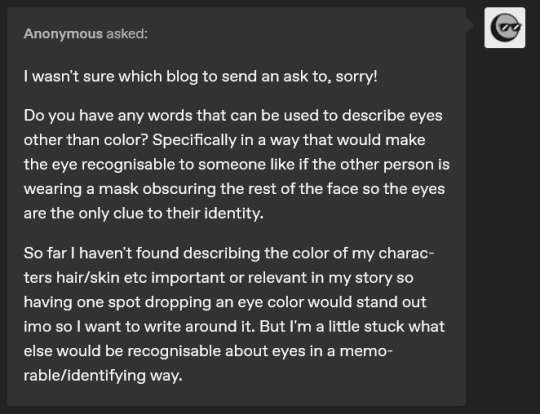
Some Words to Describe Eyes
Ablaze - radiant with light or emotion
Alert - watchful and prompt to meet danger or emergency
Angelic - resembling, or suggestive of, an angel (as in purity, holiness, innocence, or beauty)
Beady - small, round, and shiny with interest or greed
Beguiling - agreeably or charmingly attractive or pleasing
Bewitching - powerfully or seductively attractive or charming
Blazing - of outstanding power, speed, heat, or intensity
Bloodshot - inflamed to redness
Calm - still; free from agitation, excitement, or disturbance
Captivating - charmingly or irresistibly appealing
Cold - marked by a lack of the warmth of normal human emotion, friendliness, or compassion
Critical - exercising or involving careful judgment or judicious evaluation
Curious - marked by desire to investigate and learn
Doe-eyed - having large innocent-looking eyes
Dry eye - a condition associated with inadequate tear production and marked by redness, itching, and burning of the eye
Eagle eye - one that sees or observes keenly
Eye roll - an upward turning of the eyes especially as an expression of annoyance, exasperation, disbelief, etc.
Feline - sleekly graceful
Flecked - marked with streaks or spots
Gleaming - glinting; to give off reflection in brilliant flashes
Glistening - shining with reflected light
Good eye - a special ability to recognize a particular thing or quality
Gloomy - having a frowning or scowling appearance
Guileless - innocent, naive
Hypnotic - readily holding the attention
Inviting - attractive, tempting
Iridescent - having or exhibiting a lustrous or attractive quality or effect
Irresistible - impossible to resist (i.e., to exert force in opposition)
Keen/sharp eye - a special ability to notice or recognize a particular thing or quality
Lovestruck - powerfully affected by feelings of romantic love for someone
Magnetic - possessing an extraordinary power or ability to attract
Moon-eyed - having the eyes wide open
Mysterious - exciting wonder, curiosity, or surprise while baffling efforts to comprehend or identify; mystifying
Narrowed - to lessen in width or extent
Opalescent - reflecting an iridescent light
Penetrating - having the power of entering, piercing, or pervading
Piercing - perceptive
Puffy - swollen in size; bloated
Radiant - vividly bright and shining; marked by or expressive of love, confidence, or happiness
Rheumy - having a watery discharge from the mucous membranes
Riveting - having the power to fix the attention; engrossing, fascinating
Scrunched - to cause (something, such as one's features) to draw together—usually used with up
Sheep's eye - a shy longing usually amorous glance—usually used in plural
Soulful - full of or expressing feeling or emotion
Striking - attracting attention or notice through unusual or conspicuous qualities
Sultry - hot with passion or anger
Tantalizing - possessing a quality that arouses or stimulates desire or interest
Tearful - flowing with or accompanied by tears
Tired - drained of strength and energy
Vapid - lacking flavor, zest, interest, animation, or spirit; flat, dull
Wandering eye - a tendency to look at and have sexual thoughts about other people while already in a romantic relationship
Watchful - carefully observant or attentive
Weary - exhausted in strength, endurance, vigor, or freshness
Weather eye - constant and shrewd watchfulness and alertness
Worshipful - giving or expressing worship or veneration
Sources: 1 2 ⚜ Word Lists ⚜ Writing Resources PDFs ⚜ Describing Eyes
It's alright (I have too many sideblogs for my own good at this point)! You can find more words to describe eyes in the sources linked above. Hope this helps with your writing.
732 notes
·
View notes
Text
Writing Notes: Fantasy Worldbuilding

Fantasy worldbuilding - the process of creating a fictional world replete with core characters, overlapping storylines, detailed settings, and fantastical elements that set the world apart from our own.
A clear, detailed fantasy world will help readers invest in the characters that inhabit it.
Essential Elements of a Fantasy World
The fantasy genre often contains elements of science fiction, magic, or imaginative creatures—but it’s more than just writing every fictional element you can think up. The world of your fantasy novel, video game, television show, or film has to make sense in order for the rest of its parts to work in harmony.
Magic: Decide if there is a magic system in place, then set the rules of it. What powers it? Is it a secret? Can anyone use it?
Geography: It may be helpful to create a fantasy map. Identify major landmasses and historic sites. How does the landscape impact the plot or the characters? What is the climate like? You can get as specific as identifying the indigenous flora and fauna, even if you don’t use those details. As a world-builder, you can include as much or as little in your process and final version as you like—as long as your story comes together in a way that makes sense for the audience.
Society: Figure out the inhabitants of your fantasy world. What language do they speak? What do they look like? Are they humanlike? Are they creaturelike? What sort of culture do they have? How have previous historical events impacted the way they live now?
History: While you don’t have to outline the beginning of your world’s history to the end, it’s useful to know of any key events like wars, plagues, political strife, extraterrestrial invasions, or anything else that had an effect on the way your world operates now.
Time: How does it flow in your world? Is there a calendar? Are there seasons? What affects the light and the darkness?
How to Create a Fantasy World
There are many avenues for writing fantasy worlds, and you can start with whichever aspect you like first:
Use real life as inspiration. That doesn’t mean taking people from existing ethnic groups and putting costumes on them—but observe how other cultures live, how they interact with their environments and each other. By incorporating real-life into your fantasy book, you can avoid falling into tropes and clichés, and create a richer template for your characters and plot to thrive in.
Define the setting. A good starting point when creating a fantasy story is the universe itself. Is this an imaginary world existing within our own world, like Black Panther’s Wakanda? Or is it its own entirely new world, like Narnia in C.S. Lewis’s fantasy series The Chronicles of Narnia? Describe what the landscape looks like, what colors it contains, or how many suns and moons it has. Any details that can help make your fantasy world feel more like real-life in order to help ground it in something believable will make a difference in how your audience feels and experiences it.
Create inhabitants. A fantasy world has more than one type of inhabitant. They can be vastly different from one another, or only have subtle contrasts between them. For example, in J.R.R. Tolkien’s Lord of the Rings, the magical world setting of middle-earth has both Dwarves and Hobbits, which, despite both being the smaller races, contain many differences between them. They each have their own origins and backstories, temperaments, key aesthetics, daily life routines, and various other aspects that enrich and define the separate races. Inhabitants include the antagonists as well. Make them more than one-dimensional bad guys—give them a motivation that’s relevant to the world they live in.
Make magic. Implement your magic system, if there is one. Write its limits, along with its capabilities. For instance, in George R. R. Martin’s Game of Thrones, the magic in the world seemingly gets stronger when the main character Daenerys Targaryen brings about the birth of her dragons. Magic needs rules in order to function properly in your fantasy world, and while you don’t need to include a list of laws in your writing, the use of it must make them apparent.
Source ⚜ More: References ⚜ Writing Resources PDFs
161 notes
·
View notes









